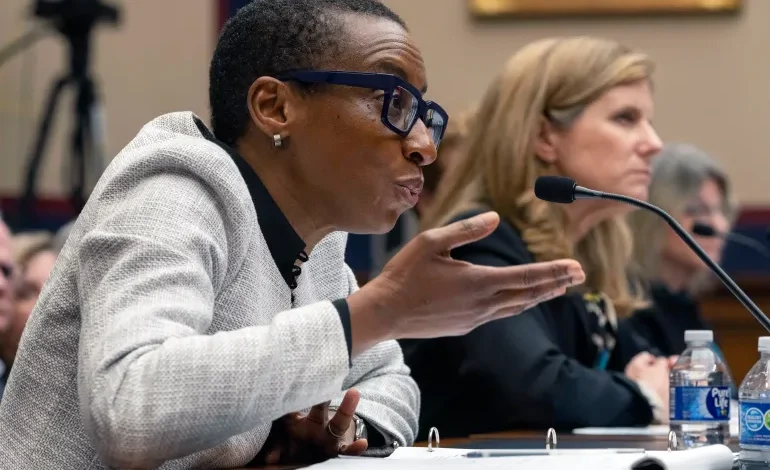Israel-Gaza war on US campuses: Why are top university leaders under fire?

Leaders at the three top universities in the United States have faced calls to resign after their testimony before a congressional hearing on campus anti-Semitism set off a firestorm of criticism.
On Tuesday, Harvard University announced it would keep political scientist Claudine Gay as its president, after her counterpart at the University of Pennsylvania, Elizabeth Magill, stepped down over the weekend.
Gay, Magill and Sally Kornbluth, the president of the Massachusetts Institute of Technology (MIT), have all faced a backlash since their joint appearance before Congress on December 6, where they were asked how they would address anti-Semitism at their universities.
Republican Representative Elise Stefanik grilled the academic leaders for offering evasive answers about whether calls for the “genocide of Jews” violated their schools’ codes of conduct.
“Calling for the genocide of Jews is dependent on the context?” Stefanik said incredulously in response to their answers. “That is not bullying or harassment? This is the easiest question to answer yes.”
Fears over anti-Semitism and other forms of hate have spiked since the start of the Israeli war in Gaza on October 7, which sparked widespread campus protests in the US.
As pro-Israel and pro-Palestinian protesters clashed, university leaders faced scrutiny over what speech is protected on school grounds – and what, if anything, should be limited.
Let’s take a look at the congressional hearing and why the presidents’ testimonies have drawn bipartisan backlash, including from the White House:
Why was the hearing held?
Jewish advocacy group Anti-Defamation League and some other similar groups have warned that anti-Semitism is on the rise on US campuses, particularly since the start of the Gaza war. The staunchly pro-Israel group, however, has been accused of conflating the criticism of Israel with anti-Semitism.
Politicians, particularly on the right, have pointed to those reports as evidence that the liberal atmosphere on college campuses has gone too far.
Pro-Israel groups have deemed student chanting of the slogan, “from the river to the sea”, to be pro-Hamas, but analysts say the term has more complex roots. They say the phrase is an expression of the Palestinian desire for freedom from oppression across the historical land of Palestine.
On December 6, the House Committee on Education and Labor held a hearing to address concerns about campus anti-Semitism, calling on Gay, Magill and Kornbluth to speak.
“Today, each of you will have a chance to answer to and atone for the many specific instances of vitriolic, hate-filled anti-Semitism on your respective campuses,” Republican Representative Virginia Foxx told the university presidents.
She added that the tense atmosphere denies students “the safe learning environment that they are due”.
What happened at the hearing?
The three university presidents testified at the five-hour-long hearing, addressing how they balanced free speech with concerns for campus safety.
But it was their interaction with Stefanik towards the end of the hearing that fuelled viral outrage.
Stefanik pressed the three leaders about whether calling for the genocide of Jews would be considered harassment, insisting on direct answers. In one such exchange, she posed a hypothetical question to Magill: “Does calling for the genocide of Jews violate Penn’s rules or code of conduct, yes or no?”
Magill said it would depend on the context. “If the speech turns into conduct, it can be harassment, yes.”
“I am asking, specifically, calling for the genocide of Jews, does that constitute bullying or harassment?” Stefanik said.
“If it is directed and severe, pervasive, it is harassment,” Magill answered.
“So the answer is yes,” Stefanik said, appearing exasperated.
All three presidents refused to issue blanket statements that calling for genocide would constitute conduct violations. At one point, Gay said terms like “intifada” – the Arabic word for “uprising” – were “personally abhorrent”, but she underscored her support for “free expression, even of views that are objectionable”.
Why did the testimonies spark controversy?
Much of the outrage stemmed from the fact that the university presidents did not unequivocally condemn calls for genocide, thereby appearing tolerant of hate speech.
Tom Ginsburg, a professor of law at the University of Chicago, said the presidents came across as “lawyered”, “defensive” and perhaps “out of touch”.
However, he said, “in substance, it’s not clear that anything any of them said was wrong or inaccurate”. The presidents were simply reflecting the broad protections for free speech afforded under the First Amendment of the US Constitution.
“We live in a country where you can call for the genocide of groups and, if you’re not imminently going to cause them harm, that’s legal,” he explained.
“Go on to Twitter. It happens all the time. So [the presidents] were trying to talk about their policies, obviously, in a way which preserved their ability to say that they were applying the First Amendment.”










